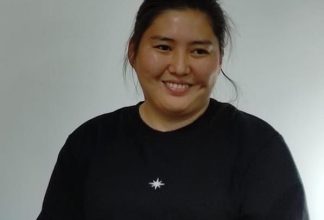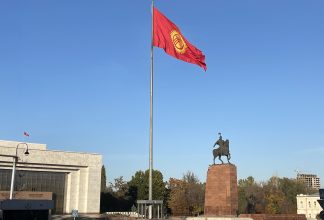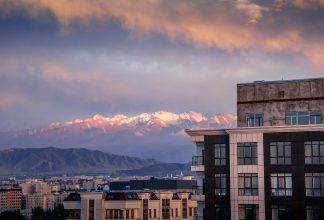Kyrgyzstan Must Free Human Rights Defender Azimjon Askarov
Four years ago, during two media appearances in Berlin and Bishkek, Kyrgyz President Almazbek Atambayev publicly announced that he had no interest in keeping an innocent man in jail. The man Atambayev spoke about– first during a joint press conference with German Chancellor Angela Merkel and then with Kyrgyz media– is Azimjon Askarov, a human rights defender and a journalist who was imprisoned for life in September 2010.
Now, six years on and countless court hearings later, the Kyrgyz leader has not honoured his commitment and Askarov still remains incarcerated. Civil Rights Defenders calls on the authorities to immediately release Askarov and drop all charges against him.
Since he was jailed in June 2010, Askarov and his lawyers have strenuously attempted to prove that he committed no crime, and that the charges levied against him – ranging from incitement to ethnic hatred and an attempt to take a local mayor hostage, to participation in the killing of a local policeman during a tragic ethnic conflict – have all been fabricated in retaliation for his exposé of abuses committed by the regional police and prosecutors.
According to reports and statements from his colleagues, prior to his arrest Askarov had extensively reported on the fabrication of criminal cases and the use of torture against detainees by those in charge of protecting laws and serving justice in southern Kyrgyzstan where he comes from.
Such serious charges being brought against a journalist spurred many human rights defenders into looking into the case in more detail and the allegations levied against Askarov in order to uncover the truth.
The overwhelming conclusions were that the charges brought against Askarov were unsubstantiated and the case itself was in fact rigged by a plethora of procedural violations all which should have led to his immediate release. The violations were widespread: illegal detention, physical abuse while in state custody, lack of access to his lawyer, threats and physical attacks against his lawyer while acting on his behalf inside the court room and the silencing of defence witnesses.
With the overwhelming evidence lying at the feet of the Kyrgyz judiciary and authorities for stark breaches of the right to a fair trial and the failure to investigate these gross violations, instead of releasing him the courts handed Askarov a life sentence, denying him an appeal.
Finding no justice at home, Askarov and his defence team filed a case against Kyrgyzstan to the Geneva-based UN Human Rights Committee. After some 4 years of deliberations and review of the documents filed by both parties – Askarov’s lawyers and the state prosecution – the Committee ruled in March 2016 that the case was without doubt rigged and that Kyrgyzstan had failed to prove the charges against Askarov. The Committee also urged Kyrgyzstan to free Askarov, quash his convictions, pay him reparations, and if required, revisit the case in court.
Instead of complying with Kyrgyzstan’s international human rights commitments and delivering his promise to free him, President Atambayev astonished the press and everyone in the human rights community by publicly declaring that the UN experts had not called for Askarov’s release.
Kyrgyz officials blatantly violated their government commitments under a number of UN treaties as well as under domestic laws requiring his immediate release, and instead decided to partially comply with the UN Committee ruling by bringing Askarov back for a retrial.
This time around his retrial was conducted in a much less hostile atmosphere. According to news reports, the defense witnesses as well as co-defendants in the case were able to testify on his behalf, and their statements confirmed that the charges against him were not only unsubstantiated but in fact based on false statements that the prosecution had extracted from them through the use force and threats.
In turn, the prosecution witnesses failed to elaborate on specific details in connection with these charges. According to media reports, they failed to identify what clothes Askarov was wearing on the day when he was allegedly committing those crimes, or explain why he was not present as required by law during his house search nor how a 60-year-old unarmed man could kidnap an official in the presence of armed border guards. Prosecutors have also failed to explain why the regional police, who publicly testified as seeing Askarov minutes before their colleague was killed, detained him only 3 days after the crime was committed.
Now that the retrial is about to end – the Chui Regional Court is scheduled to announce the verdict on January 24 – Kyrgyzstan has a chance to undo all the wrongs committed in the case.
We urge President Atambayev to commit his political will to ensuring that Askarov, an innocent man, walks free. Rule of law dictates that it is the prosecutors who have to prove a suspect’s guilt, and as both the UN Committee’s ruling and media reports from his recent retrial demonstrate, Kyrgyz prosecutors have wholly failed to substantiate any of the grave charges brought against him.
Kyrgyz authorities, including the courts, must demonstrate to the world and the people of Kyrgyzstan that not only do they respect international rule of law but domestic laws also, and that they are fully committed to abiding to the principles set therein. All of these standards require full, not partial, compliance with the UN Committee’s ruling in Askarov’s case.


